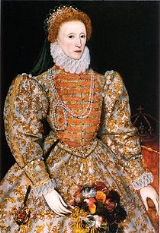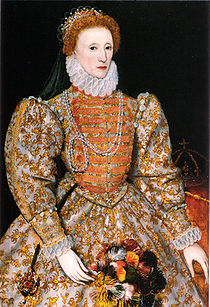
On Monsieur’s Departure
Encyclopedia
On Monsieur’s Departure is an Elizabethan
poem attributed to Elizabeth I
. It is written in the form of a meditation on the failure of her marriage negotiations with François, Duke of Anjou
.
The Elizabethan Era
saw the emergence of the English Renaissance
and consequently that of such notable figures as Edmund Spencer, Sir Francis Bacon, and William Shakespeare
.
Elizabeth I was unusually well-educated for a person of her time and wrote several poems, which seem to have been based on her life, in an era
where courtly love was the European tradition. “On Monsieur’s Departure,” is a tale in which the persona
has fallen victim to unrequited love.


stanzas
, each in iambic pentameter
, with a rhyme scheme following the ABABCC pattern.
The second stanza is about her unhappiness. It is her constant companion, she has never been able to make it go away, and she feels that only death could banish it.
In the third stanza Elizabeth asks for less intense feelings, saying she is fragile. She wishes Anjou were less nice so that she could get over her feelings more easily. The fourth line means either that she wishes she could feel good or bad, which would seem to contradict the first line, or that she wishes she could show (and vent) these feelings properly, or perhaps that she could feel one extreme or the other, rather than both at once: high OR low. Finally, she says if she cannot be happier, she would like to die so that thoughts of love no longer trouble her. She doubts she will ever be fulfilled in terms of love. Whether she really wanted to die or said that for dramatic effect is unclear, and of course the overall sincerity of the poem is also unclear.
they portray it in a different manner. Elizabeth shares the responsibility with her lover and even knows of his pain. Yet in, “My Lute, Awake!” the author leaves all the blame to the woman that he desires and does not wish her well.
that surfaces from this disillusion but also understands the other person’s perspective
. Her dilemma
is suppressing her emotions. The poem is expressed with a sorrowful tone. Hence, creating a feeling of pity
in the audience
, specifically in the closing line, “Or die and so forget what love ere meant” (18).
's novel Legacy, Elizabeth starts writing the poem as Anjou leaves her. The first part of the poem is written in the book as this happens.
The third episode of the BBC
drama Elizabeth R
, which deals with the courtship of the Queen, was titled 'Shadow in the Sun' after the poem. At the end of the episode Elizabeth (Glenda Jackson
) mentally composes the poem as she watches her suitor depart.
Selected lines of the poem were adapted and set to music by Michael Phipps and sung by the Mediaeval Baebes for the soundtrack to the later BBC drama The Virgin Queen.
In the Channel 4 drama Elizabeth I, starring Helen Mirren
as the Queen, the poem is given to Anjou upon his departure and as he reads it on the boat, Elizabeth's voice recites it over the scene.
Elizabethan literature
The term Elizabethan literature refers to the English literature produced during the reign of Queen Elizabeth I .The Elizabethan era saw a great flourishing of literature, especially in the field of drama...
poem attributed to Elizabeth I
Elizabeth I of England
Elizabeth I was queen regnant of England and Ireland from 17 November 1558 until her death. Sometimes called The Virgin Queen, Gloriana, or Good Queen Bess, Elizabeth was the fifth and last monarch of the Tudor dynasty...
. It is written in the form of a meditation on the failure of her marriage negotiations with François, Duke of Anjou
François, Duke of Anjou
Francis, Duke of Anjou and Alençon was the youngest son of Henry II of France and Catherine de' Medici.-Early years:...
.
The Elizabethan Era
Elizabethan era
The Elizabethan era was the epoch in English history of Queen Elizabeth I's reign . Historians often depict it as the golden age in English history...
saw the emergence of the English Renaissance
English Renaissance
The English Renaissance was a cultural and artistic movement in England dating from the late 15th and early 16th centuries to the early 17th century. It is associated with the pan-European Renaissance that is usually regarded as beginning in Italy in the late 14th century; like most of northern...
and consequently that of such notable figures as Edmund Spencer, Sir Francis Bacon, and William Shakespeare
William Shakespeare
William Shakespeare was an English poet and playwright, widely regarded as the greatest writer in the English language and the world's pre-eminent dramatist. He is often called England's national poet and the "Bard of Avon"...
.
Elizabeth I was unusually well-educated for a person of her time and wrote several poems, which seem to have been based on her life, in an era
Era
An era is a commonly used word for long period of time. When used in science, for example geology, eras denote clearly defined periods of time of arbitrary but well defined length, such as for example the Mesozoic era from 252 Ma–66 Ma, delimited by a start event and an end event. When used in...
where courtly love was the European tradition. “On Monsieur’s Departure,” is a tale in which the persona
Persona
A persona, in the word's everyday usage, is a social role or a character played by an actor. The word is derived from Latin, where it originally referred to a theatrical mask. The Latin word probably derived from the Etruscan word "phersu", with the same meaning, and that from the Greek πρόσωπον...
has fallen victim to unrequited love.
Full text


Structure
The poem consists of three sestetSestet
A sestet is the name given to the second division of an Italian sonnet , which must consist of an octave, of eight lines, succeeded by a sestet, of six lines. The first documented user of this poetical form was the Italian poet, Petrarch. In the usual course the rhymes are arranged abc abc, but...
stanzas
Stanza
In poetry, a stanza is a unit within a larger poem. In modern poetry, the term is often equivalent with strophe; in popular vocal music, a stanza is typically referred to as a "verse"...
, each in iambic pentameter
Iambic pentameter
Iambic pentameter is a commonly used metrical line in traditional verse and verse drama. The term describes the particular rhythm that the words establish in that line. That rhythm is measured in small groups of syllables; these small groups of syllables are called "feet"...
, with a rhyme scheme following the ABABCC pattern.
Analysis
In the first stanza Elizabeth means that she hides strong unhappiness and love (of Anjou) in favour of an appearance of cool and dislike. This show may be meant to please her subjects or save her pride because the idea of her marriage with Anjou was very unpopular amongst her subjects. In any case, she has turned (or is turning) from her former (and more natural) self (or behavior) to something different.The second stanza is about her unhappiness. It is her constant companion, she has never been able to make it go away, and she feels that only death could banish it.
In the third stanza Elizabeth asks for less intense feelings, saying she is fragile. She wishes Anjou were less nice so that she could get over her feelings more easily. The fourth line means either that she wishes she could feel good or bad, which would seem to contradict the first line, or that she wishes she could show (and vent) these feelings properly, or perhaps that she could feel one extreme or the other, rather than both at once: high OR low. Finally, she says if she cannot be happier, she would like to die so that thoughts of love no longer trouble her. She doubts she will ever be fulfilled in terms of love. Whether she really wanted to die or said that for dramatic effect is unclear, and of course the overall sincerity of the poem is also unclear.
Comparisons
This poem differs from poems such as, “My Lute, Awake!” written by Sir Thomas Wyatt, during the same time period. While they both portray unrequited loveUnrequited love
Unrequited love is love that is not openly reciprocated or understood as such, even though reciprocation is usually deeply desired. The beloved may or may not be aware of the admirer's deep affections...
they portray it in a different manner. Elizabeth shares the responsibility with her lover and even knows of his pain. Yet in, “My Lute, Awake!” the author leaves all the blame to the woman that he desires and does not wish her well.
Theme
Elizabeth expresses the feeling of sorrowSorrow
Sorrow may refer to:* Sorrow * Sorrow , an EP by The 3rd and the Mortal* "Sorrow" * "Sorrow" * "Sorrow" * "Sorrow" , also covered by The Merseys and David Bowie...
that surfaces from this disillusion but also understands the other person’s perspective
Perspective (cognitive)
Perspective in theory of cognition is the choice of a context or a reference from which to sense, categorize, measure or codify experience, cohesively forming a coherent belief, typically for comparing with another...
. Her dilemma
Dilemma
A dilemma |proposition]]") is a problem offering two possibilities, neither of which is practically acceptable. One in this position has been traditionally described as "being on the horns of a dilemma", neither horn being comfortable...
is suppressing her emotions. The poem is expressed with a sorrowful tone. Hence, creating a feeling of pity
Pity
Pity originally means feeling for others, particularly feelings of sadness or sorrow, and was once used in a comparable sense to the more modern words "sympathy" and "empathy"...
in the audience
Audience
An audience is a group of people who participate in a show or encounter a work of art, literature , theatre, music or academics in any medium...
, specifically in the closing line, “Or die and so forget what love ere meant” (18).
Popular culture
In Susan KaySusan Kay
Susan Kay is a writer.She is most known for her book, Phantom, which expands upon the history of Erik, the hideous, brilliant character from Gaston Leroux's The Phantom of the Opera, in an episodic format of seven chapters from different characters' points of view - first Erik's mother,...
's novel Legacy, Elizabeth starts writing the poem as Anjou leaves her. The first part of the poem is written in the book as this happens.
The third episode of the BBC
BBC
The British Broadcasting Corporation is a British public service broadcaster. Its headquarters is at Broadcasting House in the City of Westminster, London. It is the largest broadcaster in the world, with about 23,000 staff...
drama Elizabeth R
Elizabeth R
Elizabeth R is a BBC television drama serial of six 85-minute plays starring Glenda Jackson in the title role. It was first broadcast on BBC2 from February to March 1971, through the Australian Broadcasting Corporation in Australia and broadcast in America on PBS's Masterpiece Theatre.- Episodes...
, which deals with the courtship of the Queen, was titled 'Shadow in the Sun' after the poem. At the end of the episode Elizabeth (Glenda Jackson
Glenda Jackson
Glenda May Jackson, CBE is a British Labour Party politician and former actress. She has been a Member of Parliament since 1992, and currently represents Hampstead and Kilburn. She previously served as MP for Hampstead and Highgate...
) mentally composes the poem as she watches her suitor depart.
Selected lines of the poem were adapted and set to music by Michael Phipps and sung by the Mediaeval Baebes for the soundtrack to the later BBC drama The Virgin Queen.
In the Channel 4 drama Elizabeth I, starring Helen Mirren
Helen Mirren
Dame Helen Mirren, DBE is an English actor. She has won an Academy Award for Best Actress, four SAG Awards, four BAFTAs, three Golden Globes, four Emmy Awards, and two Cannes Film Festival Best Actress Awards.-Early life and family:...
as the Queen, the poem is given to Anjou upon his departure and as he reads it on the boat, Elizabeth's voice recites it over the scene.
Sources
- Applebee, Arthur N., et al. The Language of Literature- British Literature. Boston: McDougal Littell, 2000.

